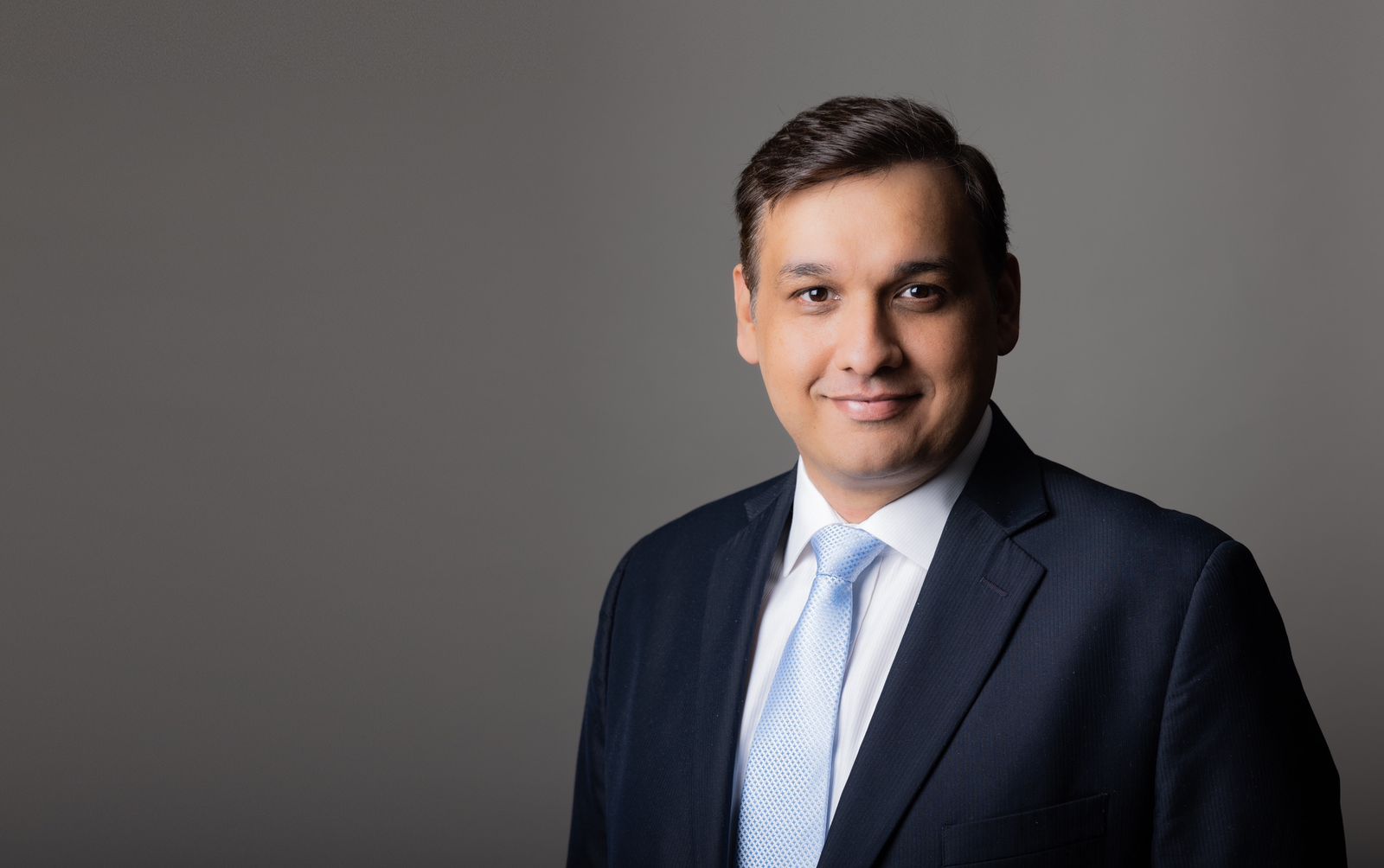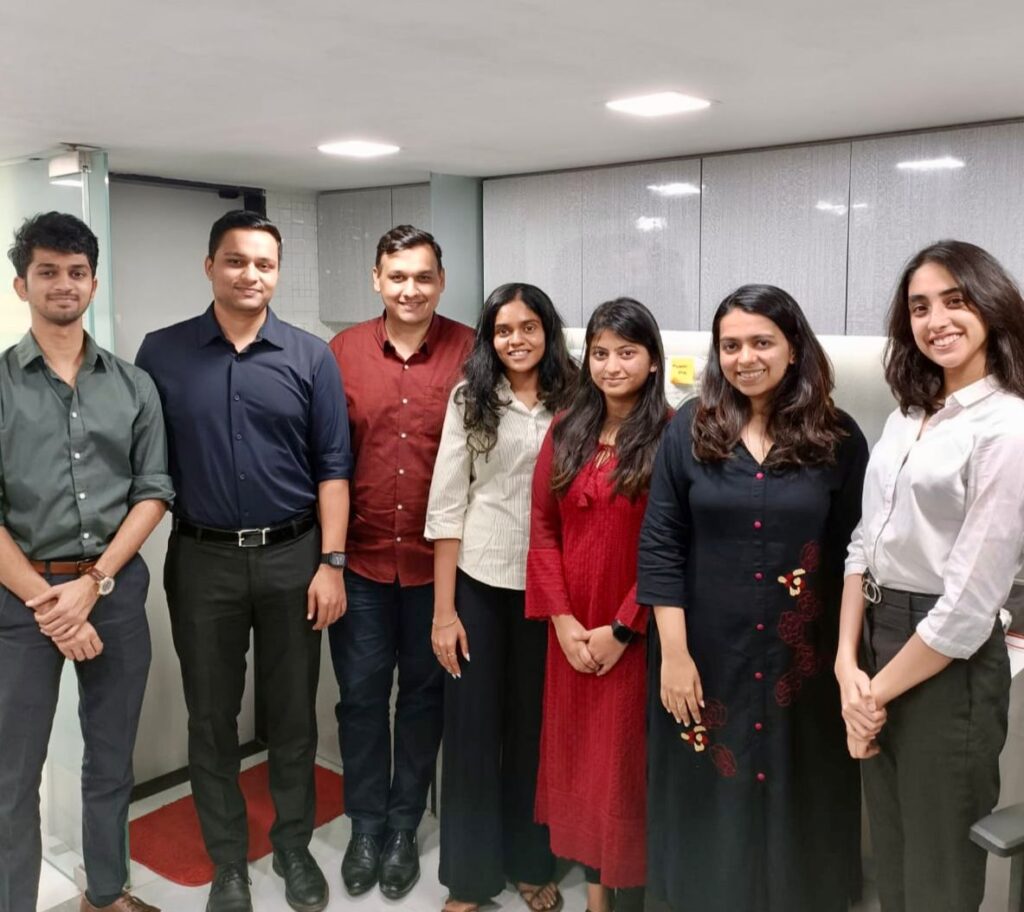Legal News
Pulastya Legal: India’s leading IPR firm led by Mr. Abhishek Sharma and his team
Published
1 year agoon


Aishani Sharma & Khushi Thawani, Mumbai Uncensored, 16th February, 2023:
A modest law firm called Pulastya Legal works with clients to offer them excellent corporate and intellectual property legal services. The firm has local offices in Mumbai, Delhi, Bengaluru, and Jabalpur. It also maintains tight relationships with foreign legal firms, which enhances its capacity to serve clients in foreign regions including North America and Europe.


The firm helps businesses and people preserve their legal rights by concentrating on the protection of intellectual property. Pulastya Legal focus on each customer, regardless of size or status, has contributed to its success.
Companies that create software and mobile apps, private equity and venture capital firms, FMCGs, hotels and restaurants, advertising firms, digital and mobile entertainment platforms, pharmaceutical enterprises, and many more are just a few of the firm’s clients. The firm takes pride in its capacity to develop a close relationship with clients’ businesses and provide them with appropriate advice.
We recently interviewed one of the managing partners of the company who pursued LL.B. (Hons.) from Vivekananda Institute of Professional Studies, Guru Gobind Singh Indraprastha University in Delhi, India and LL.M. in Intellectual Property, Commerce and Technology from the Franklin Pierce School of Law, University of New Hampshire School of Law. Read his thoughts below:
Q.1 Could you please tell us about your background and how you got into the field of law?
I am a second-generation lawyer, my father was a lawyer and ever since childhood, I have been very fascinated by the legal system. My experience in law school was a combination of positive opportunities from my law school and also much self-reflection. Being the inaugural class of our newly established law school, we had the honor of learning from some outstanding visiting faculty as well. I’ve always loved the general law and order around me, but law school helped me structure that passion and broadened my perspectives on how the law functions in society. My intense interest in law led me to numerous conferences and seminars, and it frequently allowed me to meet legal titans. In law school, I participated in several competitions and learned the art of drafting and oral arguments through moot courts. I particularly identified my interest in Intellectual Property Laws in the 3rd year and started paying more attention to IP-related news and events. I subscribed to almost all the literature available in the libraries and became a keen consumer of knowledge. In my 5th year, I even enrolled for a Post Graduate Diploma in Intellectual Property Laws, from FICCI, where I learned about global IP laws, which took me a step closer towards my LL.M from the US.
Q2. What inspired you to start your own law firm?
After my education and experience of receiving an LLM degree from a top U.S. law school and working with a California-based law firm, I have always been passionate about using my expertise to help businesses and individuals navigate the complex world of intellectual property laws. After 8 years of practising IP law with a US law firm, I felt the pull to start my own firm where I could offer clients personalized and innovative solutions to their legal needs.
The inspiration to start my own law firm came from a desire to offer clients a unique and customized approach to IP law. In many large law firms, clients can often feel like just another case file, and their needs can get lost in the shuffle. With my own firm, I wanted to provide a more personal touch, taking the time to understand each client’s unique situation and goals and working with them to find the best solution for their needs.
In starting my own IP law firm, I also saw the opportunity to bring my years of experience and expertise to a broader range of clients. With offices in Bengaluru, Mumbai, and Delhi, I am able to serve clients across India and around the world, helping them protect their valuable intellectual property assets. Whether they’re inventors, entrepreneurs, or large corporations, I am committed to providing them with the highest-quality legal representation and the best possible outcome.
Overall, starting my own IP law firm has been a challenging and rewarding experience, and I’m proud to be serving clients from all over the world. With my unique combination of education, experience, and expertise, I am confident that we can offer clients the high-quality legal representation they deserve.
Q3. Can you describe the services your law firm offers to clients?
My firm, Pulastya Legal is a boutique law firm engaged in providing high-quality intellectual property and corporate legal services to its clients. The firm has continuously worked to provide its clients with the best and most responsible guidance and service, taking into account the demands of a developing and competitive legal market. Pulastya Legal has been able to carve out a niche for itself in the legal industry owing to a relentless focus on knowledge management, effective client communication, and relationship management. At the firm, we support each and every clients, whether it was a matter of selecting the best kind of business entity for their enterprise, negotiating and drafting legal agreements, such as vendor agreements, employment agreements, non-disclosure agreements, etc., or safeguarding and upholding their trademarks, copyrights, patents, and design rights in India or abroad.
Q4. How does your law firm approach clients’ legal needs and work to find the best solution for their situation?
At our IP law firm, we approach each client’s legal needs with a focus on their unique business goals and budget constraints. Our goal is to provide customized and cost-effective solutions that meet each client’s individual needs and help them protect their valuable intellectual property assets.
We believe in maintaining the nobility of the legal profession and working with clients to build long-term relationships based on trust and mutual respect. This is why we take the time to understand each client’s situation and needs and work closely with them to develop tailored legal strategies that meet their goals and budget.
One of the ways we approach clients’ legal needs is by taking a collaborative and consultative approach. We work with clients to identify the challenges they’re facing, and then develop legal strategies that help them overcome those challenges and achieve their goals. Whether they’re looking to protect their patents, trademarks, or copyrights, we help them navigate the complex world of IP law and find the best solution for their situation.
Another important aspect of our approach is our commitment to providing high-quality legal representation at a fair price. We understand that legal services can be expensive, which is why we work with clients to find cost-effective solutions that meet their needs and budget. Whether they’re a small startup or a large corporation, we are committed to providing them with the highest-quality legal representation and the best possible outcome.
Finally, we believe in building long-term relationships with our clients. We understand that legal needs can be ongoing, which is why we aim to be a trusted and reliable partner for our clients. Whether they need ongoing support and advice or occasional legal representation, we are always here to help and provide the guidance they need to succeed.
Q5. What sets your law firm apart from others in the industry in terms of services and approach to practicing law?
Our law firm sets itself apart by offering customized services that are tailored to the best interests of our clients. Our approach emphasizes building a human connection and maintaining open communication, which sets us apart from more traditional firms. We try to build connections beyond the invoices. Additionally, our ability to connect with clients of all generations and jurisdictions is another factor that sets us apart in the industry.
Q6. How does your law firm handle international trademark, copyright, patent and design applications, prosecution, enforcement, transfer and licensing issues?
During my LLM, I strategized my courses in a manner that I am able to build an international practice, I selected a subject called International Trademark Registration Procedure which basically was a practice-based study on how a trademark is filed and protected in several countries like India, USA and China. I regularly network with attorneys and attend events and conferences to keep myself updated. Even though we cannot practice in these international jurisdictions ourselves we work through a network of attorneys.
Q7. How do you stay current on the latest developments and changes in intellectual property laws and regulations?
A dedication to ongoing education and study is necessary to stay up to date on the recent advancements and modifications to intellectual property laws and regulations because Intellectual Property Laws are very dynamic. A few strategies I follow for staying current are as follows:
- Attending conferences and workshops related to intellectual property law
- Reading relevant legal journals and publications
- Following relevant organizations and forums, such as the World Intellectual Property Organization (WIPO)
- Engaging in online communities and forums with other intellectual property professionals as it is important to network and collaborate with other intellectual property professionals to share insights, knowledge, and best practices.
Q8. Can you speak to the importance of protecting intellectual property in today’s global marketplace?
Protecting intellectual property (IP) is critical in today’s global marketplace for several reasons. Here are some of them:
- Competitive Advantage: Protecting IP rights such as patents, trademarks, and copyrights help businesses maintain a competitive advantage by preventing others from using their unique ideas, products, or branding. This protects a company’s investments in research and development, as well as its reputation and brand identity.
- Valuation and Investment: Companies with a strong IP portfolio can use it as a valuable asset to secure investment and funding. It can also increase the value of the company and make it more attractive to potential investors.
- Encourages Innovation: Protecting IP rights encourages innovation by providing incentives for individuals and companies to invest in the development of new ideas and technologies. This is essential for driving economic growth and development.
- Facilitates Global Trade: Protecting IP rights helps facilitate international trade by ensuring that businesses can freely trade and license their IP assets. This is particularly important in the global marketplace where companies often have to navigate different IP laws and regulations in different countries.
- Protects Consumers: IP rights protect consumers by ensuring that they have access to safe and reliable products and services. This helps prevent counterfeit or imitation goods from entering the market and puts consumer health and safety at risk.
Q9. How does your firm approach working with clients to understand their unique needs and develop a customized strategy for protecting their intellectual property rights?
We typically approach this by facilitating close working interactions with clients to understand their unique needs and develop a customized strategy for protecting their intellectual property rights. We do an Initial Consultation where we schedule a meeting with the client to understand their business, goals and objectives, and to assess their current IP portfolio. Then we assess their IP assets by conducting a thorough assessment of the client’s existing IP assets, including trademarks, patents, copyrights, and trade secrets. We identify the risks that could impact the client’s IP assets, including infringement, dilution, and misappropriation and based on these findings we help them in the development of IP Strategy.
Q10. What do you see as the future of intellectual property protection and how does your law firm plan to stay ahead of the curve?
The future of intellectual property protection is rapidly evolving and will continue to do so with advancements in technology and changes across the globe. Here are a few key trends that are shaping the future of IP protection and how our law firm plans to stay ahead of the curve:
Technology and AI: With the rise of technology and artificial intelligence, IP protection is becoming increasingly complex. Our law firm is staying ahead of the curve by staying up-to-date with the latest developments in technology and AI, and working with clients to protect their IP rights in this rapidly changing landscape.
Globalization: Our law firm has a global network of attorneys that enables us to provide comprehensive IP protection services to clients around the world.
New Business Models: The rise of new business models and the gig economy is challenging traditional IP protection methods. Our law firm is adapting to these changes by working with clients to find creative and innovative solutions that protect their IP rights in the new economy.
Educating Ourselves on changing Laws: IP laws and regulations are constantly changing, making it challenging for businesses to stay up-to-date. Our law firm is dedicated to staying ahead of the curve by staying informed about changes in IP laws and regulations and providing our clients with the latest information and guidance.
Q11. How does your firm handle disputes or conflicts that may arise in the course of protecting a client’s intellectual property rights?
At Pulastya Legal, we understand that disputes can arise in the course of protecting a client’s intellectual property rights. Our approach to resolving such conflicts is to provide our clients with effective, efficient, and cost-effective services. Here are the steps that we take to do so:
Assessment: Our first step is to conduct a detailed assessment of the dispute or conflict. This includes gathering all relevant information, reviewing relevant laws and regulations, and identifying the best course of action.
Negotiation: Whenever possible, we aim to resolve disputes through negotiation and mediation. Our team of experienced lawyers has the skills and knowledge to negotiate a resolution that meets the needs and interests of our clients.
Litigation: If negotiations are unsuccessful, our firm is prepared to litigate disputes in court. Our team of litigators has a deep understanding of IP law and a proven track record of success in complex IP disputes.
Alternative Dispute Resolution: In some cases, alternative dispute resolution methods such as arbitration or mediation may be more appropriate for resolving a conflict. Our law firm is equipped to handle such cases and can provide our clients with the guidance and representation they need to resolve disputes.
Continuous Support: Our law firm provides ongoing support to our clients throughout the dispute resolution process. We work closely with our clients to ensure that they are fully informed and involved in the process and that their rights and interests are protected.
Q12. Can you discuss your firm’s approach to balancing protecting a client’s intellectual property rights while also promoting innovation and creativity in society?
We believe that while it is difficult, it is still possible to strike a balance between protecting a client’s IP and promoting innovation by adopting an approach that is in line with the law and the best interest of the client, who may think that the best way is to protect his IP first. Here are some things that we do:
Understanding Client’s Reasons: If the purpose of the client is to merely reserve the IP in his name for the time being but is ready is give it up later for the greater good, we support him. The key is to understand his reasons for protecting his IP and listen to him.
Not driven by Billings: Even though there is pressure in our law firm to constantly find ways to make money, we don’t push the client to file a trademark or patent applications, just so that bill the clients for work done. There have been many instances where we spend substantial time with the client only to realize that we should NOT protect his IP because someone already owns it. In those cases, we end up waiving off our charges for an initial consultation and advise him to work on a new product or a service. It results in financial loss to us, but we believe that we, at least protect the IP rights of the original owner of those innovations.
This also creates long-term loyalties with our potential clients, and we end up being their go-to attorneys for future matters.
Q13. How does your law firm collaborate with other professionals and organizations to provide a comprehensive approach to protecting intellectual property rights?
I believe that collaboration is an important aspect of the practice of law that has the potential to bring many benefits to both lawyers as well as their clients. We collaborate with counsels and engage in cross-referrals to ensure that our clients receive a seamless and integrated approach to intellectual property protection. Such referrals allow us to maintain and build relationships thereby increasing business opportunities. We also frequently participate in speaking engagements by various professional organizations, such as TiE, and several law colleges across the country to stay connected with the intellectual property community and to facilitate the exchange of ideas and best practices. Additionally, we utilize advanced technologies and tools to conduct IP searches, analyze and monitor our client’s trademark, and track changes in IP law, which helps us to provide timely and effective advice to our clients. By leveraging these relationships and resources, my law firm can provide clients with a comprehensive and effective approach to protecting their intellectual property rights.
Q14. What advice would you give to individuals and businesses looking to protect their intellectual property rights?
The most important advice I would like to give to individuals and businesses is to make sure you budget for legal expenses. Branding plays an important part in any business; it is important to protect your brand identity and ensure that your brand’s interests are protected. I urge businesses to file for protection of their brand’s trademark, copyright or patent, in order to secure their intellectual property rights. Businesses can implement strong safeguards, such as non-disclosure agreements, to protect confidential and proprietary information. And most importantly, you must monitor the market regularly to detect potential infringements of your Intellectual Property and take appropriate action if necessary.
Intellectual Property Right is the present and the future of the world, keeping in mind the growth of businesses and startups in the world. The field is extremely diverse and competitive, and achieving the level of success that Pulastya has achieved is no piece of cake. The inspiration to make Intellectual Property Rights reach the lowest of the population is what makes him and his law firm stand out amongst the pool of IPR experts out there. Read more about Pulastya Legal at www.pulastyalegal.com and connect with Mr. Abhishek Sharma on LinkedIn at https://www.linkedin.com/in/attorneyabhishek/
You may like
-




The Power List: Top 24 Indian Entrepreneurs Defining the Future
-




MLA Geeta Jain Demands Action Against Sabir Shaikh & YouTube Channel ‘On Record Mira Bhayandar’
-




मीरा रोड येथे ४ वर्षांच्या हिंदू अल्पवयीन मुलीवर बलात्कार केल्याप्रकरणी ४५ वर्षीय ‘मोहम्मद दाराज’ ला अटक
-




बेपत्ता हिंदू अल्पवयीन मुलीच्या वडिलांचे वाकोला पोलिसांच्या निष्क्रियतेमुळे ‘आमरण उपोषण’ करण्याची तयारी, वरिष्ठ पोलीस निरीक्षक प्रकाश खांडेकर यांच्या हाताळणीवर प्रश्न!
-




Arif Shaikh Under Suspect: Father of Missing Hindu Girl Threatens ‘Fast Unto Death’ Over Police Inaction, Questions Sr. PI Prakash Khandekar’s Handling
-




“Game Changers: Meet Entrepreneurs Influencing the Fashion Industry in India”.
Legal News
Maratha Reservation: Navigating the Complex Path of Social Justice and Constitutional Limits in India
Published
5 months agoon
November 7, 2023By
Admin

Manak Sharma, Mumbai Uncensored, 7th November, 2023:
India’s Maratha Reservation is a difficult sociopolitical problem. India’s reservation policies have generally been the focus of divisive discussion and debate for a long time. These initiatives seek to close the nation’s social and economic gaps as well as historical injustices. The Maratha community’s inclusion on the list of socially and educationally backward classes is one such divisive reservation issue.
Historically, the Maratha community in India has experienced tremendous political and social change throughout, they have also held positions of power and influence. During colonial and post-independence times, the Marathas experienced challenges with representation and socioeconomic inequality. They started asking for reservations in government positions and educational institutions in an effort to allay these worries.
Maratha reservation supporters assert that the community has historically been marginalized and subjected to socioeconomic regression, especially in rural areas. They argue that in order to elevate the Marathas, affirmative action is necessary. Advocates draw attention to the disparities between Maratha and other communities’ employment and educational backgrounds. Social justice is one of the core tenets of the reservation system. Supporters argue that granting the Marathas a reservation would help ensure equal opportunities and make amends for past injustices. In Maharashtra, the Marathas have a long history of political influence, but they contend that reservation will guarantee their voice stays strong and relevant.
The argument put forth by opponents is that include the Marathas in the reserved group would go beyond the 50% constitutional cap on reservations. Legal problems and inquiries concerning the reservation policy in general may result from this. Opponents argue that seat reservations undermine merit-based hiring and admissions, potentially affecting the overall standards of education in public schools. Other disadvantaged classes fear they will lose their reserved seat allotment if Marathas too get in reservation list. In addition, critics contend that appropriate procedures and standards ought to be set in order for the Maratha community to recognize worthy candidates.
Election results and the political atmosphere in Maharashtra may be impacted by the Maratha reservation’s political significance. Political parties hope to gain support and influence from the Maratha community by making reservations for them. Given that the Marathas have long been a powerful political force, this action may have an impact on how political power is distributed. It might also have an impact on political parties’ alliances and electoral strategies, encouraging them to pay closer attention to the goals and concerns of the Maratha community. Therefore, the Maratha reservation has the power to influence state governance and policy, as well as change Maharashtra’s political environment.
In summary, the controversy surrounding the Maratha reservation in India serves as a symbol for the larger difficulties associated with putting reservation laws into practice. While it is true that some Maratha communities have experienced socioeconomic difficulties, the reservation debate raises difficult questions. It’s still difficult to strike a balance between righting historical wrongs and making sure that admissions and appointments are determined solely by merit. Subcategorization within the reservation framework, careful candidate selection, and ongoing assessment of the policy’s overall social effects may be the way forward.
Legal News
Nawazuddin Siddiqui reached out to wife Aaliya Siddiqui for settlement; the couple finally getting a divorce
Published
1 year agoon
March 29, 2023

Nomita Jeswasni, Mumbai Uncensored, 29th March, 2023:
After all the disputed happening between the couple from past few months, actor Nawazuddin Siddiqui and wife Aaliya Siddiqui are finally getting a divorce, confirms the wife. She also claimed that she will definitely fight for the kids’ custody as they do not want to live with their father. Nawazuddin also sued his brother Shamasuddin Siddiqui and Aaliya for defamation earlier this week. The actor has asked for 100 crore and a letter of apology.
Stating that she has not yet responded to Nawazuddin’s request for a settlement, Aaliya told “Divorce will happen, that’s for sure and I will also be fighting for the custody of both my kids. Nawaz has also filed for custody, but I will not let that happen. Both my kids want to stay with me and don’t want to live with him.”
Nawazuddin is a cruel and negligent father, said Aaliya, who claims that he sent away his young daughter alone with his “male manager” who hugged her “many times in an uncomfortable manner.” She also told that she was being harassed at the actor’s Mumbai residence. In relation to a property issue, Aaliya was also the target of complaints from Nawazuddin’s mother. Aaliya stated that she and their children Shora and Yaani were thrown out from the Mumbai home in March at a late hour.
Aaliya is currently staying in a rented apartment in Mumbai. She is looking for a new place to accommodate since she was asked to vacate the place by the end of the month but is unable to find a new place due to the ongoing family dispute.
In addition, Aaliya disclosed that her financial situation has prevented their children from attending school, but she has made efforts to enrol them in various classes to ensure they stay up-to-date with their education. She further shared that she intends to change her name back to Anjana Kishore Pandey after the divorce.
Legal News
Legal notice to Netflix over ‘offensive remark’ made against actress Madhuri Dixit in Big Bang Theory
Published
1 year agoon
March 27, 2023

Nomita Jeswani, Mumbai Uncensored, 27th March 2023:
A legal notice was sent to Netflix by political analyst Mithun Vijay Kumar for allegedly insulting Bollywood actress Madhuri Dixit in one of The Big Bang Theory’s episodes. Kumar claimed that the creators were encouraging sexism and misogyny in their work. He also ordered that the show be taken off the air for defaming the actress.
For those who are unfamiliar, Sheldon Cooper, played by Jim Parsons, compares Aishwarya Rai to Madhuri Dixit in the first episode of The Big Bang Theory. He refers to Aishwarya Rai as poor man’s Madhuri Dixit in one scene. Raj Koothrapalli, another character played by Kunal Nayyar, responds to his remark by saying, “Aishwarya Rai is a goddess, by comparison, Madhuri Dixit is a leprous prostitute.”
“It is important to hold companies like Netflix accountable for their actions and to ensure that they are sensitive to the cultural values and sentiments of the communities they serve. I strongly believe that streaming service providers have a responsibility to carefully curate the content that they offer on their platforms. It is their duty to ensure that the material they present does not include derogatory, offensive, or defamatory content. I was deeply troubled by the use of a derogatory term in one of the shows on Netflix – Big Bang Theory. This term was used in reference to the acclaimed actress Madhuri Dixit, and it was not only offensive and deeply hurtful but also showed a lack of regard for her dignity.” said Mithun Kumar in a statement
“I strongly believe that streaming service providers must take such issues seriously and act quickly to address any instances of offensive or defamatory content. Furthermore, streaming service providers should be proactive in preventing such content from being streamed. This can be achieved through clear guidelines and rigorous screening processes for all the content published. Ultimately, streaming services have a significant influence over the content that is consumed by millions of individuals, and with this influence comes a responsibility to ensure that the content they offer is respectful, inclusive, and free from harmful stereotypes. I hope that this incident will serve as a wake-up call to all streaming services providers to work towards creating a more equitable and respectful media landscape,” he concluded.
Chuck Lorre and Bill Prady’s CBS sitcom The Big Bang Theory started in 2007. The show also starred Kaley Cuoco, Johnny Galecki, Simon Helberg, Mayim Bilaik, and other actors. 2019 saw the airing of the final episode.
Trending
-



 Special Editions2 weeks ago
Special Editions2 weeks ago“Game Changers: Meet Entrepreneurs Influencing the Fashion Industry in India”.
-



 Special Editions3 weeks ago
Special Editions3 weeks agoSheLeads 2024: Inspirational Stories of Women Entrepreneurs Reshaping India’s Business Landscape
-



 Crime News3 weeks ago
Crime News3 weeks ago11 year old minor assaulted for saying ‘Jai Shri Ram’, forced to chant ‘Allahu Akbar’ in Mira Road
-



 Special Editions2 weeks ago
Special Editions2 weeks agoFrom Underground to Spotlight: The Rising Icons of the Indian Fashion Industry 2024
-



 Entertainment3 weeks ago
Entertainment3 weeks agoFrom Pixels to Stardom: India’s Supreme Digital Creators

